WMG News
WMG Workshop Manager selected for key technical advisory role
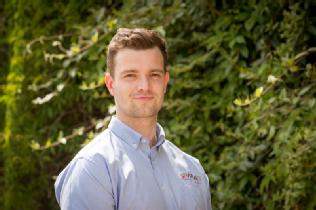 Congratulations to Zachary Parkinson, WMG at the University of Warwick’s, Workshop Manager, who has been appointed to the Technical Council at the Institute for Technical Skills and Strategy (ITSS).
Congratulations to Zachary Parkinson, WMG at the University of Warwick’s, Workshop Manager, who has been appointed to the Technical Council at the Institute for Technical Skills and Strategy (ITSS).
The ITSS was established in March 2023 and is funded by Research England. It is hosted by the University of Nottingham in partnership with a network of organisations and institutions across UK higher education and research, including the University of Warwick.
It was launched to ensure that the UK has the technical capability and capacity across academia, research, education, and innovation. Its aim is to support and enable the UK to be a global superpower in science, engineering, and the creative industries.
The ITSS received over 150 submissions to join its council with just 14 individuals, including Zac, selected as one of the very first founder members.
Zac and his fellow members will act as ITSS ambassadors meeting quarterly to advise on the needs of the technical community, contribute to progressing ITSS programmes/initiatives and to provide input on the assessment of internal submissions.
Members serve an initial two-year term, after which membership is refreshed to allow a wide range of ideas and individuals to be included.
Zac Parkinson, Workshop Manager at WMG, University of Warwick said: “I feel extremely privileged to have my application accepted to join the ITSS Council, and I am looking forward to working closely with other universities and external organisations to ensure we are providing the opportunities and skills required to help increase the number of skilled technicians across the country.”
Paul Johnson, Technical Services Manager at WMG, University of Warwick added: “It was great to hear that we have one of our own working with this new UK Institute that will make real change and influence the landscape for technicians working within universities. Zac is well placed, having been an apprentice, technician and now technical manager to help influence decisions and build on the good work already being conducted within the sector.’’
Find out more about WMG’s Technician Commitment here: Technician Commitment (warwick.ac.uk)
WMG backs campaign to encourage more young people to consider technical careers
According to recent reports, the UK needs around 800,000 more technicians and apprentices to meet the demand in the economy for the sort of practical science jobs to boost innovation and economic growth. This is why WMG, University of Warwick, is supporting the Gatsby Charitable Foundation’s Technicians: We Make the Difference campaign.
Technicians are making a difference across society, doing exciting and interesting jobs in almost all industries; from making a life-saving vaccine to working behind the scenes at a music festival. It's their balance of scientific, engineering, or technological knowledge, along with skills such as attention to detail and critical thinking, that makes technicians special.
WMG employs more than 50 technicians, including Engineering Technician, Bethany Haynes and Battery Technician, Divyesh Mistry who feature as case studies on Gatsby’s new Technicians: We Make the Difference website.
You can hear more from Bethany here: Bethany Haynes, Engineering Manufacturing Technician | Technicians and Divyesh here: Divyesh Mistry, Battery Technician | Technicians as they share their experiences with the aim to inspire more young people to consider technical careers.
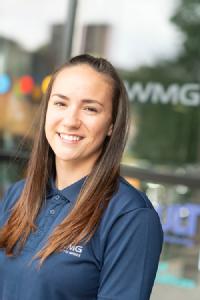 Bethany Haynes, Engineering Technician based in WMG, at the University of Warwick’s SME Team, says: “This is such an amazing project to be a part of as it is so important for young people to be aware of the technical roles out there. I love the fact that there is a technical role that will harness and encourage the majority of skillsets, especially practical skills. I have always been a technician and genuinely love my job, yet at school I was always told I needed to go to university and have a degree to have a good job.
Bethany Haynes, Engineering Technician based in WMG, at the University of Warwick’s SME Team, says: “This is such an amazing project to be a part of as it is so important for young people to be aware of the technical roles out there. I love the fact that there is a technical role that will harness and encourage the majority of skillsets, especially practical skills. I have always been a technician and genuinely love my job, yet at school I was always told I needed to go to university and have a degree to have a good job.
“Technicians: We Make the Difference shows that you can have a career with or without a degree. I’m looking forward to visiting the Science Museum next weekend and seeing all the cool things other technicians are doing.”
Divyesh Mistry, Mechanical Technician based at WMG at the University of Warwick’s Energy Innovation Centre, adds: “It was a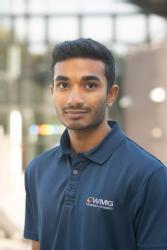 privilege and an honour to take part in the Gatsby project. Each technician has their own skills and abilities, which allow for fundamentals of their profession to thrive. It’s great to see the technician career path be advertised, and I recommend it as a fulfilling career with lots of opportunities.”
privilege and an honour to take part in the Gatsby project. Each technician has their own skills and abilities, which allow for fundamentals of their profession to thrive. It’s great to see the technician career path be advertised, and I recommend it as a fulfilling career with lots of opportunities.”
Paul Johnson, Technical Services Manager at WMG explains: “It’s great to see our technical staff involved in this crucial initiative. I say crucial because the skill shortage, that we now see across the educational and research landscape, has to be addressed now. To do that we need to engage the next generation of technicians, and those young people that we reach out to need to be inspired. Hearing from early career technical professionals, through outreach programmes such as this, can only help to galvanise the desire that young technicians have and drive them to pursue a career in science and technology.”
Research by Gatsby shows that while parents are becoming more supportive of technical education routes and qualifications, such as T-Levels, many (40%) still don’t understand what a technician is. Furthermore, two thirds (66%) say their child has expressed an interest in a future career that they know very little about.
Together with Gatsby, WMG wants to help parents and young people learn more about technician careers options and routes available (many of which young people can reach via T-levels, apprenticeships and other more practical, work-based routes).
Find out more about WMG’s Technician Commitment here: Technician Commitment (warwick.ac.uk)
ENDS
For more information on Gatsby’s Technicians: We Make the Difference campaign, please contact technicians@kindredagency.com.
Sources:
· Parents and young people survey – A survey, carried out by Censuswide, of 2,004 parents of children aged 11-16, and their children. The survey was conducted between 27th July – 1st August 2022.
· Parents survey – A survey carried out by Censuswide of 2,000 parents of 11–18-year-olds who attend non-fee-paying schools. The survey was carried out in March 2022.
About Technicians: We Make the Difference
Technicians: We Make the Difference is a campaign by the Gatsby Charitable Foundation that aims to educate parents and young people alike on technician careers.
While some technicians work in a lab, most don't. Technicians are making a difference across society, doing exciting and interesting jobs in almost all industries.
It's their balance of scientific, engineering, or technological knowledge with skills like attention to detail and critical thinking that makes technicians special. That can be almost anything - from making a life-saving vaccine to working behind the scenes at a music festival.
And with thousands of other interesting technician roles across almost every kind of industry - there's a good chance that there will be one out there that you would enjoy.
Find about more about how technicians make a difference every day via www.technicians.org.uk.
Researchers develop technology solutions to enhance the safety and efficiency of connected and autonomous vehicles in complex road junctions
Researchers at WMG, University of Warwick have developed technology solutions for safer and more efficient automated driving when navigating complex road junctions such as roundabouts.
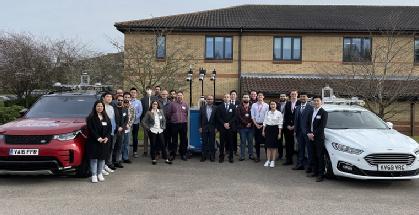 Working in partnership with Jaguar Land Rover, TRL and the University of Surrey, researchers from the Intelligent Vehicles directorate at WMG, University of Warwick have implemented a Proof of Concept demonstrator. This demonstrator focusses on unleashing the power of Edge and Cloud Computing, using a “connected roundabout” at the University of Warwick’s main campus.
Working in partnership with Jaguar Land Rover, TRL and the University of Surrey, researchers from the Intelligent Vehicles directorate at WMG, University of Warwick have implemented a Proof of Concept demonstrator. This demonstrator focusses on unleashing the power of Edge and Cloud Computing, using a “connected roundabout” at the University of Warwick’s main campus.
The Cloud Assisted Real-time Methods for Autonomy (CARMA) project, is part of the £11m TASCC programme funded by the Engineering and Physical Sciences Research Council (EPSRC) and Jaguar Land Rover. Supported by WMG’s Centre High Value Manufacturing Catapult, the CARMA project was established with the intention to create secure and resilient cloud-based platforms to enable safe and robust semi-autonomous functions on future cars in the short term, and with the vision of achieving fully autonomous vehicles.
Professor Mehrdad Dianati, Head of Intelligent Vehicles Research at WMG, University of Warwick said: “We expect autonomous vehicles to be much safer, much more efficient and much more comfortable than human driven vehicles. Unfortunately, with existing sensor and computing technologies, it is difficult and expensive to achieve the level of accuracy and reliability of the perception of the environment that’s expected.”
“CARMA not only demonstrates how these concepts could be implemented in practice, but also highlights what the impact of such technologies might be. This research will help manufacturers, technology developers, policy makers and road operators to make informed decisions on how they will adopt technologies in future road infrastructure, regulations, products and services.”
CARMA researchers installed eight infrastructure cameras, as off-board sensors, at the roundabout to monitor the environment and stream video to a base station called ‘Edge’. Using two-way communication, the Edge processes its own live information with information received from nearby connected vehicles. This processed data containing object, traffic, road layout and lane availability information is broadcast and received by the vehicles.
Dr Graham Lee, Principal Engineer at WMG, University of Warwick, added: “At complex road junctions, the CARMA platform can help enable on-road autonomy by providing additional real time data about the environment through the use of off-board sensors and computing. This gives vehicles the ability to navigate complex road junctions safely and efficiently.”
Dr Saber Fallah, Director of the Connected Autonomous Research Lab at the University of Surrey commented: “This technology enables new business models for the transportation system in alignment with the rise of shared mobility. In addition, autonomous vehicle technology also highlights the potential for how elderly people or disabled people can benefit from the joy of driving from point A to point B safely.”
The testing infrastructure was supported by the Midlands Future Mobility project, Innovate UK and the Centre for Connected and Autonomous Vehicles of the UK Government. The Open Innovation Platform research vehicle used within the project was developed with support from the High Value Manufacturing Catapult and used alongside the CARMA research vehicle provided by JLR.
Over ten follow-on projects have been inspired by CARMA, as technological, regulatory and business challenges are to be overcome before the concept can be deployed on a mass scale. Through the project 23 early career scientists and engineers were trained and three patents were granted along with 40 publications on the work carried out.
Joint European effort boosts automated driving
- L3Pilot, Europe’s first comprehensive pilot test of automated driving on public roads demonstrates automated systems for cars in Hamburg, Germany, in conjunction with ITS World Congress 2021
- SAE Level 3 and 4 automated driving systems have been tested on ordinary roads in seven European countries, including cross-border activities, thanks to pan-European testing environments and methodologies that have been developed with help from WMG, University of Warwick
- A “Code of Practice” has been created to speed up and harmonise the development of automated driving systems as well as a framework for collection, storage and evaluation of large amounts of data
- Increased safety identified as main benefit of SAE Level 3 automated driving systems
From 11 to 15 October the European research project L3Pilot, which WMG at the University of WarwickLink opens in a new window has worked on, led by Volkswagen AG and co-funded by the European Commission, showcases automated driving functions in the City of Hamburg and on motorways nearby. The four-year project will now come to its successful end with performing its Final Event in conjunction with the ITS World Congress in Hamburg 2021.
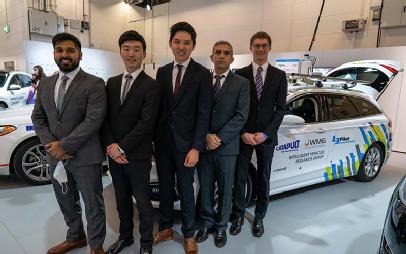 Running from 2017 to 2021, the project consortium brought together stakeholders from the whole value chain, including car manufacturers, suppliers, academia, research institutes, infrastructure and governmental agencies, user groups and the insurance sector.
Running from 2017 to 2021, the project consortium brought together stakeholders from the whole value chain, including car manufacturers, suppliers, academia, research institutes, infrastructure and governmental agencies, user groups and the insurance sector.
The experience of the partners in large-scale testing intelligent vehicle technologies made it possible to create a pan-European testing environment. The Code of Practice for the Development of Automated Driving Functions (CoP-ADF) is one of the major achievements of L3Pilot. It provides comprehensive guidelines for supporting the design, development, verification and validation of automated driving technologies.
Fourteen partners focused on testing automated driving functions in normal motorway driving, traffic jams, urban driving and parking. The pilots, running from April 2019 until February 2021, involved seven countries: Belgium, Germany, France, Italy, Luxemburg, Sweden and the United Kingdom and included two cross-border activities between Germany and Luxemburg as well as Germany, Belgium and the United Kingdom.
WMG, at the University of Warwick focussed on the development of a proof-of-concept prototype and a real-world demonstration of a cutting-edge technology for cooperative perception, using WMG’s state-of-the-art Open Innovation Vehicle Platform and mobile roadside units.
Aiming to enable safe automated driving at complex driving scenarios, such as roundabouts and T-junctions, the equipment was funded by the WMG Centre High Value Manufacturing (HVM) Catapult.Link opens in a new window Specialising in innovation aimed at making transport cleaner, safer and more efficient, the CentreLink opens in a new window works with UK manufacturing partners to develop automated, connected, electric and shared mobility for a sustainable future.
However WMG also contributed to a variety of key project activities including: Cyber Security Analysis of highly automated driving functions in highway environments, known as highway chauffeur, and the development of a Consolidated Database (CDB) to store large datasets acquired in the project during the experimental phase, which also included designing and implementing a web-based User Interface (UI) to provide access to CDB for L3pilot users, for example, partners and data analysts.
Prof. Mehrdad Dianati, from WMG at the University of Warwick comments:
“A major challenge for the safety of automated vehicles is how they will navigate through complex road segments, a part of our role in L3Pilot was to demonstrate how this challenge can be addressed using state-of-the-art cooperative automated driving technology we have developed at WMG.
L3Pilot Coordinator Aria Etemad, Volkswagen AG comments:
“Automated driving has a huge potential to make mobility safer, more efficient and more comfortable. The L3Pilot partners made great efforts to pursue piloting and met the project goals – despite the tremendous pandemic crisis. This shows the outstanding commitment of our Europe-wide partner network. One of our major achievements is a Code of Practice for the Development of Automated Driving Functions. It provides guidelines that will support the development of safe and reliable automated driving systems.”
 The project equipped 70 vehicles and the test fleet comprised 13 different vehicle brands, from a passenger car to a SUV. More than 400,000 kilometres were driven on motorways including 200,000 km in an automated mode and 200,000 km in a manual mode as a baseline for comparison of the user experience and evaluation of the impacts. More than 24,000 km were travelled in the automated mode in urban traffic. With the aim to put the focus on the user experience of automated driving functions, over 1,000 persons participated in piloting and complementary virtual environment tests.
The project equipped 70 vehicles and the test fleet comprised 13 different vehicle brands, from a passenger car to a SUV. More than 400,000 kilometres were driven on motorways including 200,000 km in an automated mode and 200,000 km in a manual mode as a baseline for comparison of the user experience and evaluation of the impacts. More than 24,000 km were travelled in the automated mode in urban traffic. With the aim to put the focus on the user experience of automated driving functions, over 1,000 persons participated in piloting and complementary virtual environment tests.
The project focused on SAE Level 3 automated driving functions on motorways and in urban traffic, while SAE Level 4 functions targeted exclusively parking and close-distance scenarios. The SAE Level 3 features Conditional Automation which requires the driver to respond appropriately to a request to take-over the vehicle control for manual driving. In case the driver is not responding properly to a take-over request, the vehicle performs an automatic minimum risk manoeuvre to safely stop the vehicle.
Moreover, L3Pilot carried out extensive supplementary tests to also research user experiences that were difficult to address in large-scale piloting due to safety requirements and legal issues. Therefore, supplementary studies were performed in addition to the on-road piloting to be able to study system usage and other relevant user experiences with ordinary, non-professional drivers in safe and virtual environments. The extensive studies comprised some 600 subjects.
Research evaluation results have shown that increased safety is the main benefit of SAE Level 3 automated driving systems. They also show that an automated driving system consisting of motorway, urban and parking functions for robust hands-off driving will generate a social benefit that is higher than the social costs of installing it.
L3Pilot paved the way for scaled-up driving tests with automated series vehicles in real-life traffic. This underscores the leadership of Europe's automotive industry in developing reliable, thoroughly tested and user-friendly technology.
ENDS
12 OCTOBER 2021
NOTES TO EDITORS
High-res images available at:
https://warwick.ac.uk/services/communications/medialibrary/images/september_2021/microsoftteams-image_5.png
Caption: WMG, at the University of Warwick demonstrating their technical achievement at ITS World Congress.
Credit: WMG, University of Warwick
https://warwick.ac.uk/services/communications/medialibrary/images/september_2021/microsoftteams-image_7.png
Caption: WMG, at the University of Warwick demonstrating their technical achievement at ITS World Congress.
Credit: WMG, University of Warwick
https://warwick.ac.uk/services/communications/medialibrary/images/september_2021/microsoftteams-image_8.png
Caption: WMG, at the University of Warwick demonstrating their technical achievement at ITS World Congress.
Credit: WMG, University of Warwick
https://warwick.ac.uk/services/communications/medialibrary/images/september_2021/microsoftteams-image_9.png
Caption: WMG, at the University of Warwick demonstrating their technical achievement at ITS World Congress.
Credit: WMG, University of Warwick
https://warwick.ac.uk/services/communications/medialibrary/images/september_2021/microsoftteams-image_10.png
Caption: WMG, at the University of Warwick demonstrating their technical achievement at ITS World Congress.
Credit: WMG, University of Warwick
Video available to view at:
https://www.youtube.com/watch?v=eJnzMGcr9Fc
Credit: WMG, University of Warwick
L3Pilot is an Innovation Action, co-funded by the European Union under the Horizon 2020 programme with the contract number 723051. Thirty four organisations have committed to scientifically test and assess the impact of automated driving systems on driver comfort, safety and traffic efficiency as part of the project.
www.l3pilot.eu
Twitter _L3Pilot_
LinkedIn: L3Pilot
Duration: 50 months, 1 September 2017 – 31 October 2021
Total cost: €68 million
EC contribution: €36 million
Coordinator: Volkswagen AG
Partners:
Automotive manufacturers: Volkswagen AG, AUDI AG, BMW Group, Stellantis | Centro Ricerche Fiat SCPA, Ford, Honda R&D Europe, Jaguar Land Rover, Mercedes-Benz AG, Adam Opel AG, Stellantis, Renault, Toyota Motor Europe, Volvo Car Corporation
Suppliers: Aptiv, FEV GmbH, Veoneer Sweden
Research: German Aerospace Center DLR; ika RWTH Aachen University; VTT Technical Research Centre of Finland; Chalmers tekniska hoegskola; SNF – Centre for Applied Research at NHH; University of Leeds; Institute of Communication and Computer Systems ICCS; Würzburg Institute for Traffic Sciences WIVW; University of Genoa; TNO – Netherlands Organisation for Applied Scientific Research; WMG, University of Warwick; European Center for Information and Communication Technologies – EICT GmbH
Authorities: Federal Highway Research Institute BASt; The Netherlands Vehicle Authority RDW
User Groups: Federation Internationale de l’Automobile FIA
Insurers: AZT Automotive GmbH, Swiss Reinsurance Company
SMEs: ADAS Management Consulting,
For further information please contact:
Alice Scott
Media Relations Manager – Science
University of Warwick
Tel: +44 (0) 7920 531 221
E-mail: alice.j.scott@warwick.ac.uk
Professional accreditation for WMG Engineering Technician
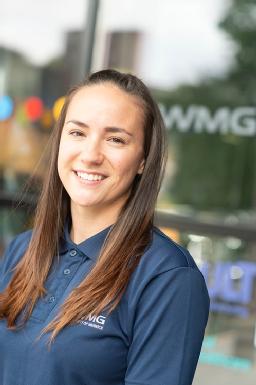 Congratulations to WMG Engineering Technician, Bethany Haynes who has received her Professional Engineering Technician (EngTech) accreditation and membership from the Institute of Mechanical Engineers.
Congratulations to WMG Engineering Technician, Bethany Haynes who has received her Professional Engineering Technician (EngTech) accreditation and membership from the Institute of Mechanical Engineers.
At WMG, Bethany provides technical support in robotics, machining, technical drawings, quotation, manufacture and fabrication.
To achieve her IMechE accreditation, Bethany had to provide details of successful projects, any technical problems she had to overcome, and evidence of new skills and knowledge developed during her career.
Bethany explained: “This is a really great personal achievement, and something I’ve been determined to accomplish for a long time. I’ve worked so hard for this, and as a young female technician it has given me a real confidence boost. I am so thankful for the support of my fellow technicians and colleagues who encouraged me to push myself.”
WMG Workshop Manager, Luke Millage, said: “It is great to see that Beth has pursued this professional registration with the IMechE. Beth has worked tirelessly to develop her skills over the last couple of years, and it is wonderful to see this formally recognised.”
EngTech is a globally recognised level of professional registration for Engineering Technicians. It is a formal recognition of engineering skills and competence and an important stepping stone towards becoming an Incorporated Engineer or a Chartered Engineer
Read more about Bethany’s career here
Engineering apprenticeship success for WMG duo
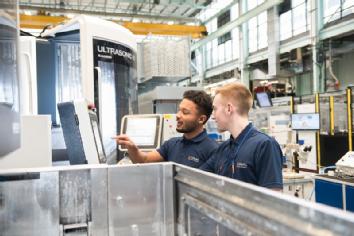 Congratulations to Joseph Benjamin and Tom Moore who have both completed a four year Engineering Technician Apprenticeship at WMG.
Congratulations to Joseph Benjamin and Tom Moore who have both completed a four year Engineering Technician Apprenticeship at WMG.
The pair started their apprenticeship journey after completing their studies at the WMG Academy for Young Engineers in Coventry.
They initially completed a Level 3 Engineering Technician Apprenticeship, before going on to a Level 4 Higher National Certificate (HNC) in Manufacturing Engineering, and have been dividing their time between working at WMG and studying at Warwickshire College.
Joseph explained: “What makes WMG a great place to work and learn is all the amazing staff, students and visitors I have had the pleasure of working with over the last four years. The support and detail of training I have received on equipment and systems is second to none. Therefore, I would like to say thank you and give a special shout out to anyone who has supported me along the way. You know who you are!
“The advice I would give to others considering an apprenticeship, is to look at what the programme can offer you. Especially in terms of development and opportunities such as qualifications and real-life experience in fields that interest you.”
Tom added: “My apprenticeship at WMG has been a fantastic opportunity, allowing me to explore a whole range of engineering disciplines, gain qualifications and ultimately find a keen interest in materials science, characterisation and microstructural analysis. Thank you to all the staff, students and external customers who have been a part of my journey. I look forward to continuing my career with you all.”
Next steps
Joseph and Tom have both now secured permanent positions as Mechanical Technicians within WMG’s Technical Services Team. Joseph is based within the Metrology research team whilst Tom is specialising in Electron Microscopy.
Zac Parkinson, WMG Workshop Manager who also line managed the apprentices, said: “ We are extremely pleased to announce that Thomas Moore and Joseph Benjamin will be joining our Technical Services team as Mechanical Technicians. Both of these young men have worked extremely hard during their apprenticeships, this is evident from their academic grades and ever-advancing skill set.
“We are grateful for their dedication to the group during their apprenticeships, achieving impressive grades and continuing to grow a network of stakeholders across WMG.
“We are also really appreciative of the role models that they have become to other younger members of our technical team.
“We are looking forward to working with them in their new roles, and watching them grow in the future.
“Well done chaps!”
WMG Apprentice Technician graduates
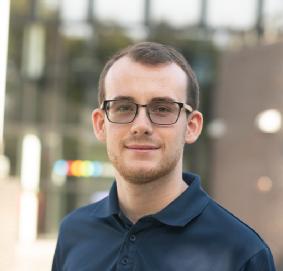 Congratulations to WMG Apprentice Technician, Zach Clarke, who recently completed his engineering degree as part of his Degree Apprenticeship programme.
Congratulations to WMG Apprentice Technician, Zach Clarke, who recently completed his engineering degree as part of his Degree Apprenticeship programme.
After his GCSEs, Zach studied a Level 3 Extended Diploma in Engineering at Warwickshire College, before starting his degree apprenticeship journey in September 2017. For the first year Zach studied full-time at college, he then spent the following two years working as an Apprentice Technician, at WMG, whilst studying towards his engineering degree.
Zach explained: “I never thought it would be possible for me to get a degree within engineering, but with the help and support of colleagues at WMG and Warwickshire College I was able to achieve this.
“I’m now in the final year of my apprenticeship, and the next 12 months will enable me to really hone my engineering skills. During this final phase I will be completing a Level 4 NVQ to consolidate further learning within the apprenticeship course.
“I’d like to thank everyone at WMG who has helped me throughout the past three years, their help has been invaluable.”
In May 2017 the University of Warwick, along with over 30 other UK universities, backed a pledge to support technicians. The Technician Commitment is a sector-wide initiative led by the Science Council and the Gatsby Foundation, aimed at addressing key challenges facing technical staff.
The commitment identifies four target areas, which WMG has committed to in order to safeguard vital technical skills. The commitment will ensure greater visibility, recognition, career development and sustainability for technicians across all disciplines.
